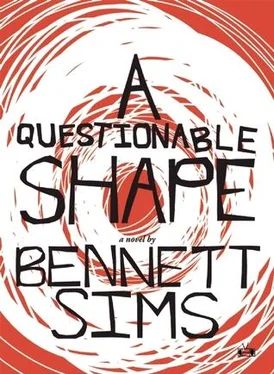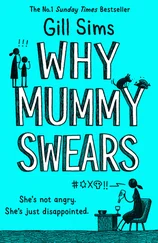FOR DINNER, RACHEL MADE A RICH ORANGE curry that she had me slice potatoes for, and I threw together a very basic salad: greens, cheese, balsamic. Mazoch thoughtfully brought a bottle of wine, a Gewürztraminer 76that I had to drink Rachel’s glass of because she complained, smacking her mouth and contorting her face, that it was too sweet. She polished off a glass of Syrah instead, and now we’re all pleasantly drunk at the table. Although the ostensible occasion for this dinner is the end of the search, none of us have dared discuss it. Nor has Rachel interrogated Matt about his motives. The furthest she has gone is to ask him how our day went, and the two of them have been going back and forth about quarantines. To distract myself in the meanwhile, I’ve been watching the candle flames gutter in their sockets. 77And on my salad plate there is a leftover film of balsamic and olive oil, a viscid, deep-brown emulsion, which — when I incline the plate left and right — rolls darkly down to the edges, like a storm cloud on a dish. Neither Rachel nor Matt seems to notice me.
‘If you ask me,’ Matt continues, ‘LCDC are being big softies. Tremendous softies. The infected need to be burned or buried, not barged. Not treated to a cruise on the Mississippi.’ Rachel looks horrified, and I know she’s struggling not to bring up Mr. Mazoch: ‘That’s so… callous . You can’t be serious.’ ‘Do you know what Baton Rouge’s current ratio is? Of the undead to the living? Something like one to twenty. So about forty thousand undead. That’s as if every LSU student were infected. And you’re telling me that you want to keep them on barges and in quarantines?’ ‘Well, we couldn’t keep them there forever. But we can’t just kill them all either. They’re people, they have families. Imagine—’ ‘Families they wouldn’t blink at eating.’ ‘—imagine if every coma victim in the nation were euthanized at once, or everyone with Alzheimer’s. That would be so tragic. Whatever this infection is, we’ve known about it for less than a year. We’ve had less than a year to study it. Why not just be patient, wait for a cure?’ ‘Because there’s no cure for death!’ Mazoch says, laughing. ‘You don’t rub Neosporin on a dead body — you burn it or you bury it.’ ‘You’re talking about genocide.’ ‘No, absolutely not, it is misguided, boneheaded, and dangerous to talk about genocide. There could be nothing less relevant or helpful right now than mapping human models of violence over what’s happening. This talk about euthanizing the undead or murdering the undead. Committing genocide. The only vocabulary commensurate with the epidemic is an epidemiological one, one that calls a virus a virus. Each undead body is a viral agent, programmed only to spread a disease, and I could no more murder one than I could murder HIV.’ ‘The problem with that analogy—’ ‘You want to personalize them, I understand that. They wander back to their homes, as if they remember, as if they’re still people. You hear pundits say, “They need to be burned,” and you bristle. You learned about the Holocaust like everyone else in elementary school, so you think we’re on the verge of some equivalent evil: the systematic cremation of millions of people. But these aren’t people. This is nothing like Europe’s so-called Jewish problem. If anything, this is a dybbuk problem. And if we don’t put a bullet in the head of every one of them, sooner or later it’s going to be a problem of apocalyptic proportions.’ ‘You can’t believe that. You sound like a movie trailer.’ ‘I really do believe it. There are forty thousand contagious cannibals — and think about that for a moment. Contagious cannibals. You get bitten and you become one, you are what you’re eaten by. Nothing could proliferate more factorially, more fatally, than a virus like that. And there are forty thousand of these killing machines being kept in, what, libraries? Dorm rooms? Barges? What happens when they break free? What happens when a hurricane hits and causes another “spill,” or when the virus mutates and becomes airborne?’ ‘So that’s your final solution: a bullet in the head of every infected citizen. Don’t bother building a more secure quarantine, or housing them on some kind of land preserve. Don’t study them and try to understand the infection. Just burn them or bury them. Never mind the fact that there’s clearly something still left in there, some residue of who they used to be. Memories of certain neighborhoods, motor skills. When you see a little infected girl picking up her violin, or when you see those lab experiments: how smart they still are, their aptitude for problem solving—’ ‘Problem solving! Let me tell you about problem solving. The only problem they’ll solve is how to get past your barricades and eat you alive. Problem solving of the octopus prying open the oyster. Problem solving of the polar bear unzipping the zipper of the tent. Those are the problems they know how to solve.’ ‘But that’s just it. We have no reason to believe they can’t be domesticated. What if they can be trained, tamed, taught not to attack people?’ ‘Rotting corpses as household pets, or in the zoos. A plague straight out of Revelations, an army of walking dead, and you’ll picket for their domestication.’ ‘I’ll “picket” so that innocent people aren’t killed. These are people, Matt. People with a disease. Do you know what I heard on the news the other week? There was a sound bite of an infected man moaning. A speech pathologist had taught him to say “Barbara.” He drew it out in a moan, it was breathy, but it was clear as day: “Barbara.” Barbara, his daughter, was in the studio when they played the sound bite, and after she heard him say her name, she buried her face in her hands and wept.’ ‘That’s very heartwarming. You could teach a parrot to say “Barbara.” You could teach a Furby to say “Barbara”! This is echolalia and nothing else, this is sophism and wishful thinking. Here’s a sound bite for Barbara: have a speech pathologist teach one to moan, “We are going to eat you.” We are going to eat you! That’s all their moaning means. Teach one to say that, and then we’ll see whether little Barbara bursts into tears.’ ‘She was forty.’ ‘Who?’ ‘Barbara. You called her “little Barbara.” But she was forty years old.’
It is at this point that Matt turns to me. ‘Well, you’ve been especially quiet this evening. What do you think about all this?’
What have I been thinking? That Matt’s vehemence in this debate comes as a shock, even to me. I can’t help wondering how much of it is the Gewürztraminer talking. The disappointment talking. Whether it is perhaps just the pointlessness of the barges — his anger at his missing father — that is fueling his resentment of the undead race right now. Or whether he is simply being provocative, contrarian, baiting Rachel with this eradication rhetoric. Whatever the explanation, he can’t possibly believe the things he’s been saying tonight. And even if he does believe them tonight, he couldn’t possibly have believed them this entire time , every day this past month. Could he? The crestfallen son I saw at Citiplace was not on the lookout for a ‘contagious cannibal’ or ‘killing machine’ to kill: he was searching for his father. So if Matt really does propose mass extermination, then he has to be making some exception in his heart for Mr. Mazoch. Doesn’t he? Not that he would shelter him and keep him alive, necessarily, just that he would be horrified if he found a lynch mob dismembering him. That at some level Matt must recognize the residual humanity of Mr. Mazoch — his ineliminable Mr. Mazochness — since at some level Matt must feel that only he, Mr. Mazoch’s son, bears the right or the responsibility to murder the man (if, indeed, he plans to murder the man). Otherwise, why search like this? Why race against what clock? Why not let the exterminators take care of him, or the armed guard, or the hurricane? Is more or less what I’ve been thinking.
Читать дальше












